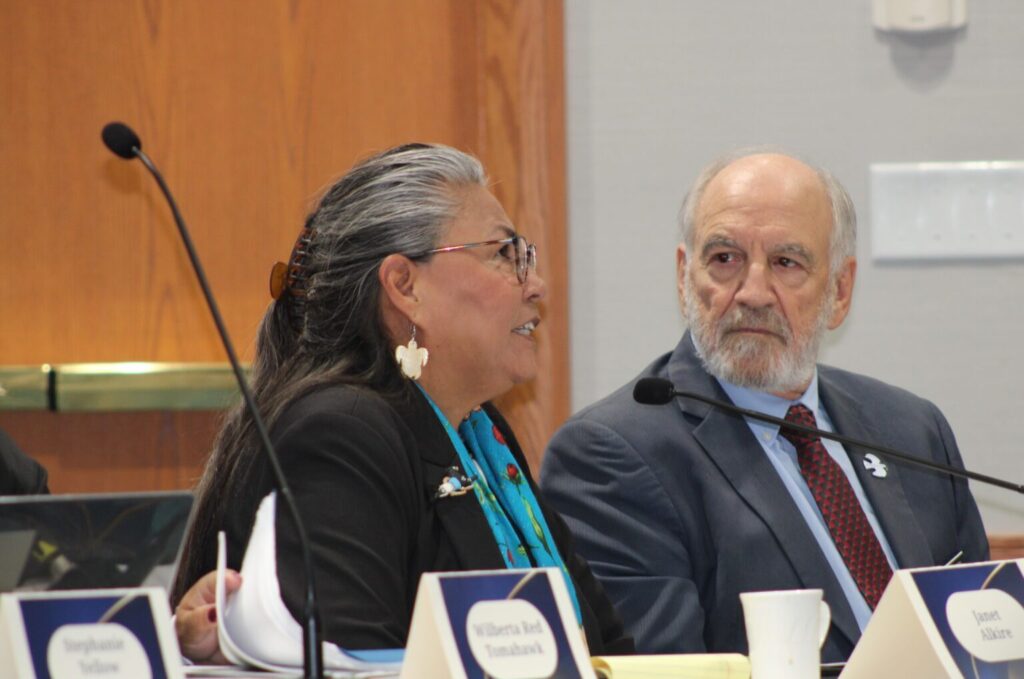Inspired by her grandparents, Tonah Fishinghawk-Chavez proves that caring for the community is an action, not just a word
North Dakota tribes eligible for state grant to promote voter access
Secretary of state recruiting tribal contacts to assist with set-aside ballots on Election Day

Members of the North Dakota Legislature listen as Secretary of State Michael Howe speaks on efforts to improve access to voting on tribal reservations at a Tribal and State Relations Committee at Prairie Knights Casino on Oct. 9, 2024. (Mary Steurer/North Dakota Monitor)
The North Dakota Secretary of State’s Office addressed efforts to make voting more accessible for tribal members during a meeting Wednesday on the Standing Rock Sioux Reservation.
Secretary of State Michael Howe said his office has a grant to assist tribes with the administrative costs of issuing IDs for voting purposes.
The pot of money for each biennium is $25,000, with each of the five federally-recognized tribes having access to up to $5,000.
This is the second budget cycle the grant has been available, Howe said at a meeting of the Legislature’s Tribal and State Relations Committee at Prairie Knights Casino. During the 2021-2023 biennium, none of the tribes used the money, Howe said. The funding is still available for this biennium.
“In the coming weeks ahead, if a tribe would like to use that $5,000 grant to help the administration of issuing IDs, that money is available to you,” Howe said.
The funding is the result of federal lawsuits that were settled between tribes and the state. Two separate lawsuits from North Dakota tribes challenged the state’s requirement that voters have IDs with street addresses. Addresses on many rural reservations are post office boxes.
A settlement of those lawsuits included reimbursing tribes for the cost of issuing addresses and IDs. The settlement also gave tribes the ability to quickly verify “set-aside” ballots.

The Secretary of State’s Office is looking for contacts from tribal governments to help verify set-aside ballots. Under North Dakota law, a voter cannot be turned away if they show up without valid identification.
The ballot won’t be counted until their qualifications are verified. They have 13 days to do so after the election.
“What the tribal nations can do is provide a contact, and then the day after Election Day, our office will send that contact a list of individuals who have voted a set-aside ballot who might be residing on a reservation and that tribal nation can then verify the qualifications of that voter,” said Erika White, elections director for the Secretary of State’s Office.
People who want to serve as contacts should reach out to White at the Secretary of State’s Office by Nov. 1 at 701-328-4146.
Valid forms of identification for voting in North Dakota include a North Dakota driver’s license; a non-driver state-issued identification card; a tribal ID or a tribal letter; and certificate from a long-term care facility.
Alice Bird Horse, a representative at-large for the Standing Rock Sioux Tribal Council, said she’s heard of incidents about poll workers turning away voters with tribal IDs. She asked Howe whether poll workers were specifically trained not to do this.
“I won’t name the specific county that it happened in, but it’s alarming to know that maybe they weren’t trained very well or educated on their duties as a poll worker,” Bird Horse said.
Howe said his office has trained all 53 county auditors about the acceptable forms of identification, who in turn train poll workers.
“We can communicate with every county to reiterate to their poll workers for the November election, nobody should be turned away,” he said.
Over the past few days, the Department of Transportation has visited Belcourt, Fort Yates and Fort Totten to issue non-driver IDs on the reservations.
The department is scheduled to visit the Spirit Lake Nation on Thursday at The Blue Building, 816 Third Ave. N., Fort Totten; and the Mandan, Hidatsa, and Arikara Nation on Tuesday at the Northern Lights Wellness Center, 710 East Ave., New Town.
For questions about the photo ID events, call NDDOT at 1-855-633-6835.
For more information about North Dakota voting requirements, go to the Secretary of State’s Office website, vote.ND.gov.
This story was updated to add context of lawsuit settlements related to tribal voting.
External
Dramatic play reveals power of Indigenous stories and community
Thousands peacefully protest
Steve Sitting Bear elected as chairman
UTTC International Powwow attendees share their rules for a fun and considerate event
Three artisans at the UTTC International Powwow in Bismarck share their creative journeys






